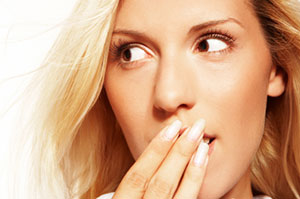
Bad breath or halitosis can be an embarrassing problem to have and between 25% and 30% of the world population suffers from it, but it’s seldom the patient’s fault and is not always related to oral hygiene. In many people, it originates from seemingly unrelated causes, such as bacterial infections, or the presence of yeast in your mouth, nose, throat, sinuses or your digestive system. It can also be caused by medical conditions such as diabetes or gastric issues.
Your dentist will be able to determine whether the cause of your problem is oral, and recommend where you can get help if it’s not. While some of these issues need antibiotics to resolve them, many problems can be treated naturally just by making some of these lifestyle changes.
The preventative measures listed are great for avoiding bad breath, but what if you already have it? Your first step is to identify the cause, so you can get medical attention if it is system-related or if you need antibiotics to resolve a non-dental infection. There may be healthy ways to treat those conditions, too, and your doctor will advise you in that respect. If your problem turns out to be oral, you can kickstart your campaign against bad breath by:
The foods we eat can have a profound effect on our breath, and eliminating onions, garlic and spices from your diet is an obvious place to start. These not only leave a strong smell in the mouth, but they also contain compounds our bodies absorb into the bloodstream. When these compounds are released again by way of the lungs it creates a “second wave” of bad breath. If you’ve ever sat beside someone who reeked of garlic, you’ll know the odour almost seems to emanate from their pores. Well, the mouth is no different, and the smell is helped along by the warm, wet environment inside and the pressure of the breath behind it when we speak.
Dairy products include amino acids that feed the bacteria in the mouth, and the same goes for alcohol, coffee and smoking, all of which can cause temporary halitosis and contribute to the development of periodontitis. That doesn’t mean you can’t have them—just that if you do indulge, take steps to minimize their effect on your mouth.
For more information on getting rid of bad breath the healthy way, please book an appointment with our dentist in Scarborough at 416-267-4661, or click here to book online.
Do you ever feel nervous about dentist appointments? Rest assured: we cater to nervous and anxious patients in a gentle and considerate manner. Call us now to schedule a free consultation!